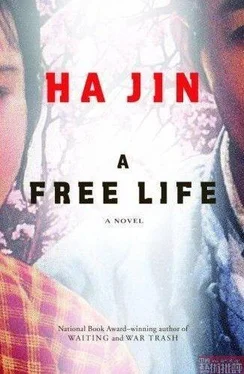"The Democratic Party is anti-white males."
Nan didn't know what to make of that.
This evening the Mitchells had come later than usual. There were so many customers that Pingping couldn't chat with Janet and Nan had to stay in the kitchen, cooking constantly. But the Mitchells seemed purposely to outstay the other customers, and when the room had finally quieted down, Janet beckoned Pingping, wiggling her forefinger. Pingping went up to her and said, "Don't do that." "Do what?"
"Move your fingers that way. It make me feel like slave or servant, like you can pull me around just by move your finger."
"All right." Janet smiled, her high cheeks coloring. "Golly, you're so sensitive. I won't do that again. Listen, I want to ask you something."
"Sure." Pingping sat down, hoping this was not about the surrogacy again.
"Have you been to Nanjing?" Janet asked. "Where?"
" Nanjing, the big city on the Yangtze River." "Ah, I see. No, I never be there, but my father's family is from somewhere near that city. You want to visit China?"
"I'm not sure. Dave and I have been thinking of adopting a baby girl."
"That's wonderful. But are you sure you want to raise Chinese kid?"
"Not one hundred percent sure yet. Tell me what you think." "Everybody can see she's not your daughter." "Dave and I thought about that too. We won't mind. As a matter of fact, we like Chinese babies."
"Why not adopt American baby?"
"That'll be very hard. You don't have a choice here. It's the biological mother who chooses the adoptive parents. Besides, you have to wait a long time, sometimes several years. And you have to hire a lawyer. It's outrageously complicated and expensive. That's why a lot of people go to other countries to adopt babies. Dave and I have met some couples who have Chinese baby girls. They're all happy." "Why do the Chinese abandon girl babies?" Dave said. "People in countryside need boys to work in fields, so they don't want girls," replied Pingping.
"Why won't some Chinese families adopt them?" asked Janet. "I guess because each family can have one baby only."
By now Nan had joined them, standing by listening to their conversation. He put in, "Zer one-child policy has a lot to do wiz it. If you already have a baby, you cannot have anozzer. So some families throw away girl babies to save zer quota for a boy. Feudalistic mentality, you know."
"Are the babies healthy?" Janet went on.
"Don't worry about that," answered Pingping. "Very few Chinese in countryside eat drugs. Many people can't afford food, no money for drugs and alcohol. The parents are young, healthy, and clean, but some of them can't read and write."
"We're not worried about that," Janet said. "We can give a good education to the child we raise."
Pingping had meant to say that although the babies were healthy, you couldn't know anything about their parents' education and intelligence. She didn't explain and asked Janet instead, "You really think adoption?"
"We've contacted an orphanage in Nanjing. Once we hear from them, I'll let you know. We'll need your advice."
"Sure. Nanjing is famous for beautiful girls."
Nan added, "Women there usually have smoos skin and fine figures. It's a majar city, and I went there once for a conference."
"That's good to know. Dave and I may go to the orphanage if we decide to adopt."
As the conversation continued, Nan left quietly to tidy up the kitchen. He was glad that the Mitchells were thinking of adoption, which meant they might not bring up the subject of surrogacy again.
NAN didn't expect Danning would write back within a month. Usually a first-class letter traveled more than ten days from the United States to China. In this case, Nan 's letter had reached his friend via the magazine; the detour must have taken an extra few days. Dan-ning wrote in a loopy, cloudy hand:
August 29, 1992
Dear Nan Wu,
What a thrill it was to hear from you. How time has been speeding by! Yes, Sirong and I married last year, and we are living in Beijing now. I didn't go to the People's University to teach. Instead, I have stayed home, writing fiction and freelancing for magazines. But I cannot continue living like this and will soon look for a stable job. Probably I will work for the Writers' Association, which is interested in me because I can speak English.
To be honest, I am not satisfied with my Alaskan novella. The editor cut too much from the story, and as a result the prose feels choppy and crude. She also put in many sentences of her own, which are out of place. Some of them are plainly jarring. The magazine was eager to cater to the readers' interest in the exotic, so the editorial department demanded that all the stories be set in foreign countries, and we were supposed to make them as outlandish as possible. I had no choice but to concede, otherwise they would not have printed the piece. Well, you see this is China, where nothing has changed much. I often feel I'm living in a net, having to navigate through many invisible holes. Sometimes I miss my old days in Cambridge, MA, where I was left alone and could dream alone, lolling on a bench outside my apartment, basking in a sunny indolence, and watching the scudding clouds.
I have been working hard on two novels, both set in the United States. Stories about American life are hot nowadays. Have you seen the book Manhattan 's China Lady? It's a runaway best seller here. My publisher is eager to have a blockbuster like that and has pressed me for the manuscripts several times. I have to finish my books soon, but I don't know how to write popular stuff and may disappoint my publisher.
Give my regards to Pingping and Taotao. Talk to you later.
Shake hands,
Danning Meng
Nan remembered the time when Danning had lived in Cambridge, but in reality his friend hadn't always had the kind of leisure described in the letter. Danning had once taken three days off from his lab, able to lounge around, but only because a tick had stuck to the top of his ear and given him a low fever and painful joints. After that letter, Nan and his friend kept up a correspondence, though they didn't write frequently, four or five exchanges of letters a year. Nan would follow the noise Danning went on making in China. Gradually Danning became a well-known author, though he never wrote anything better than his Alaskan cannery story.
Once Danning claimed that he was going to write his "great Chinese novel," which would exhaust the genre of the novel technically. Nan couldn't imagine such a monumental masterpiece and thought of asking him to define his vision, but he refrained, feeling that his friend had become a glib man, if not a blabbermouth. He mentioned Danning's ambition to Pingping, who smiled and said it might just be a boast. She simply couldn't enjoy that man's writings no matter how hard she tried.
WHEN it got cooler in late September, business began to come back at the Gold Wok, but Nan and Pingping couldn't feel relieved. Many people were still out of work, and about a third of the suites at Beaver Hill Plaza remained vacant, though the economy was reported to be improving. The large hall left by A amp;P had been filled by a Goodwill store, and the parking lot was again half full in the daytime.
One afternoon Nan sat slouching at the counter and reading his Oxford Advanced Learner's Dictionary. Beside his elbow, toward the wall, was a small aquarium in which a pair of angelfish was gliding. A string of bubbles kept spiraling up from the pebbles at the bottom of the water. As Nan was perusing the verbal idioms listed under the headword point, in came a tall man with dark hair; his ruddy face looked familiar, but Nan didn't recognize him. The man, wearing a black T-shirt, smiled and nodded at him, then stretched out his hand. "Hey, Nan Wu, don't you remember me? Dick Harrison," he said in a mellifluous voice.
Читать дальше












